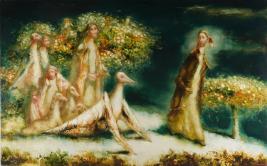Skrypka, Valeriy
Strangers

Valeriy Skrypka was born in 1964 in Zaporizhia, Ukraine into a family of artists. He graduated from the renowned Kyiv Academy of the Arts with a Master’s Degree in art in 1992. Skrypka’s work has been exhibited in museums and galleries internationally. He melds contemporary narrative symbolism with the iconography of ancient, mythological traditions of Ukraine to create imaginative works of art that shed light on universal experience. Sam Hunter, emeritus professor of art history at Princeton University, has noted that Skrypka’s aggressive use of paint, in combination with delicate and ethereal subjects, results in totally original works of art. The figures, animals, birds, and objects, touchstones from Ukraine’s ancient past and traditions are skillfully blended with the artist’s own original expressions of contemporary experience. The paintings are strong examples of the artist’s ability to create aesthetic harmony, while not flinching from the contradictory discordant realities of twenty-first century life. These profound and enduring works of art invite the viewer to contemplate the very nature of existence.
Artist's Statement
In my creativity, I aspire to interpret the inconceivableness of the universe, in which chaos wondrously coexists with the magnetism of an orderly rhythm. The components of my vision of this universe are fantastic combinations of its deformed elements. These are definite symbolic markings for speculating about the mystery of the world, a temptation to contemplate. The so-called surrealistic stresses of my fantasies are not marshaled to elicit gothic horror or disgust but rather an idyll, a unity of rhythm and motion, motion and support. My mythological beings are sphinx-like mysteries, which everyone interprets in his or her own way, yet none has solved. My creativity is a perpetual search for true understanding of the unfathomable. It is why favorite mythological symbols in my work such as the apple of paradise, a wondrous bird, and the itinerant gardener, all exist in perpetual states of metamorphosis.







